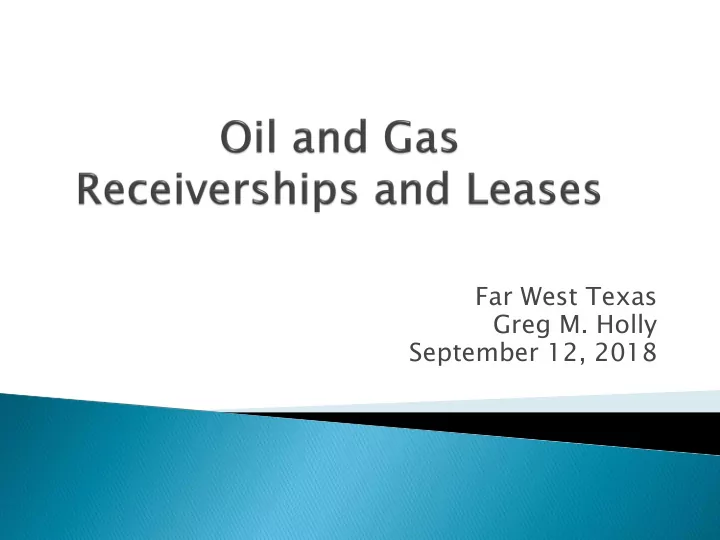

Far West Texas Greg M. Holly September 12, 2018
Brief Overview of Oil and Gas Law Discussion of Receiverships Discussion of Oil and Gas Leases
Owns the entire “bundle of sticks” Can explore for and develop the minerals Bears 100% of costs (and risks) Enjoys 100% of the net profits
Owner of the mineral estate transfers, for a period of time, the right to explore for and develop the minerals Lessee bears 100% of the costs (and risks) Parties share in the rewards, if successful ◦ Lessor – bonus and royalties ◦ Lessee – net profits - after costs, royalties, etc.
“Three (3) years and for so long thereafter as oil or gas is produced in paying quantities” Primary term ◦ No obligation to explore, drill, etc. Secondary term ◦ Held by production in paying quantities
Termination of Lease Once Production Begins ◦ Generally held by production on the lease ◦ Partial terminations as to acreage and/or depths ◦ Can be “pooled” with other acreage If pooled, lessors share throughout the unit, proportionately reduced If pooled, lease is held by production within the unit
Minerals “severed” from the surface Mineral estate with multiple owners
Different owners – surface and minerals Mineral estate is the “dominant estate” ◦ Right to use as much of the surface as is “reasonably necessary” to develop the minerals Surface use agreements ◦ Agreed-upon damages for specified uses of surface
Often, MANY owners in a particular tract Lessee desires to lease entire estate Don’t want any “carried interests” ◦ These don’t share the risks, but share in profits What if some owners can’t be found?
You own what you “capture” (what comes up) Creates risk of drainage, of course
Missing (unlocated) owners Reasons for receiverships for these ◦ Economics – no “carried interests” ◦ Encourage development of the land ◦ Prevent Drainage
(b-1) and (c) – applicant must show ◦ Unlocated (unlocatable) mineral owners – no taxes ◦ Diligent but unsuccessful efforts to locate them ◦ Substantial damage or injury – usually drainage (d)(2) – service by publication – atty ad litem (d)(3) – receiver appointed (judge or other) (d)(5) – no bond required
By statute, or as authorized by the court ◦ 64.091(f) – “as ordered by the court…” Statutory duties – 64.091(f) and (g) ◦ Execute leases and pooling agreements Common court-ordered duties ◦ Receive and deposit bonus and royalties ◦ Pay (cause to be paid) ad valorem taxes No authorization to execute division orders.
Make sure they’re reasonable. Bonus ◦ Payment for primary term – paid per mineral acre Royalty ◦ Payment as a percentage of production – often ¼ Primary Term ◦ Grace period before operations – 3 years is plenty
Operators requesting tax ID #’s ◦ How would you get one of these? ◦ Just tell them they’re ordered to pay, and if they don’t (or if they deduct), they can explain to the district judge why they aren’t complying. Executing subsequent leases ◦ 64.091(f) speaks of leases and subsequent lessees
Payments under the lease (bonus, royalty) ◦ 64.091(h) – paid to district clerk, into registry ◦ If sent to you, endorse as “________, Receiver” and deliver to the clerk. Payments for receiver’s services ◦ At execution of lease Usually agreed – some pay 5% (352.002, Estates Code) ◦ At closing of receivership Also usually agreed – based on service, # of years, etc.
Owners found – purpose no longer exists Alleged owner must prove up his ownership in district court – motion, hearing, etc. ◦ Court can even determine heirship if no pending proceeding in county court. Role of receiver ◦ Not to agree, but to test the proof of ownership. Receivership closed, and funds distributed
County-owned minerals Necessary for similar reasons as receiverships ◦ Economics – no “carried interests” ◦ Encourage development of the land ◦ Prevent Drainage
Taxpayers’ property ◦ Sale or lease governed by statute Chapter 71, Natural Resources Code ◦ 71.002 – authority to lease ◦ 71.003 – governing body (commissioners court)
71.004 – notice and hearing 71.005 – newspaper notice of intent lease 71.006 – bids considered 71.007 – can reject bids and seek again 71.008 – public auction is an alternative 71.009 – no less than one-eighth royalty (¼) 71.010 – no primary term > 10 years (3) 71.052 – ok to include pooling provisions
Greg M. Holly Ward County Judge (432) 943-3209 greg.holly@co.ward.tx.us
Recommend
More recommend